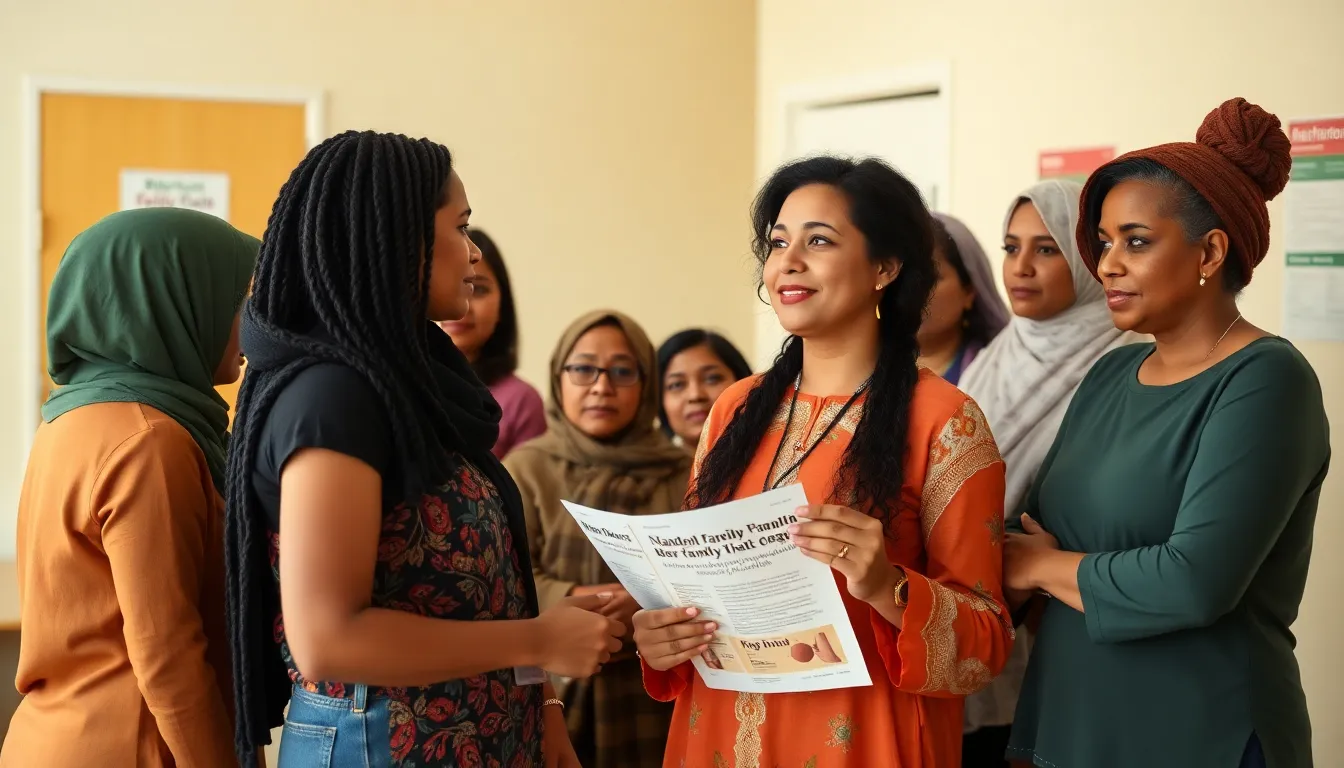Reproductive health is a crucial aspect of overall well-being, yet it often doesn’t receive the attention it deserves. With increasing awareness of reproductive rights and health issues, individuals are seeking ways to enhance their reproductive health for better quality of life. From understanding menstrual cycles to exploring fertility options, taking proactive steps can lead to significant improvements in health outcomes.
In today’s fast-paced world, misinformation can cloud understanding of reproductive health. By focusing on evidence-based practices and education, people can empower themselves to make informed choices. This article delves into essential strategies for enhancing reproductive health, providing insights that can help individuals navigate their reproductive journeys with confidence and clarity.
Table of Contents
ToggleUnderstanding Reproductive Health
Reproductive health encompasses various aspects of the reproductive system, including physical, mental, and social well-being. Recognizing its significance in overall health can lead to informed choices and improved quality of life.
Definition and Importance
Reproductive health refers to the complete well-being in matters related to the reproductive system. It includes the capability to reproduce, manage one’s sexual and reproductive functions, and maintain a positive sexual experience. Importance lies in the influence it has on societal health, family planning, and personal empowerment. Individuals benefit from understanding their reproductive health, as it directly impacts overall physical health and emotional well-being. Access to reproductive health services promotes healthier communities and leads to informed self-care practices.
Key Components of Reproductive Health
- Menstrual Health: Understanding menstrual cycles aids individuals in recognizing patterns and potential health issues. Regular menstrual cycles are indicators of reproductive health.
- Fertility Awareness: Knowledge of fertility signs enhances family planning. Individuals can track ovulation and possibilities for conception through various methods.
- Sexual Health: Engaging in safe sexual practices prevents sexually transmitted infections (STIs) and promotes healthy relationships. Awareness of safe sex methods is pivotal.
- Access to Services: Access to healthcare services, including screenings and contraceptive options, plays a vital role in reproductive health management. Availability of these services encourages proactive health measures.
- Education and Information: Comprehensive education on reproductive health fosters informed decision-making. Access to accurate information combats misinformation and promotes healthy choices.
Understanding and addressing these key components allow individuals to navigate their reproductive journeys more effectively, enhancing their reproductive health status.
Challenges in Reproductive Health

Various challenges hinder the enhancement of reproductive health, impacting individuals and communities. Addressing these obstacles can lead to improved health outcomes and greater empowerment.
Socioeconomic Factors
Socioeconomic status significantly affects reproductive health access and outcomes. Individuals with lower income levels often experience inadequate access to healthcare services, nutritional food, and safe living conditions. For example, women in low-income households may face barriers to contraception and prenatal care, increasing risks of unintended pregnancies and complications. Research shows that communities with higher poverty rates often exhibit elevated rates of sexually transmitted infections (STIs) and maternal mortality.
Cultural Barriers
Cultural beliefs and practices can create additional challenges in reproductive health. Stigma surrounding reproductive issues often silences individuals, preventing open discussions about sexual health, contraception, and family planning. In some cultures, misconceptions about reproductive health can lead to harmful practices, such as child marriage or female genital mutilation. Addressing these cultural barriers requires community engagement and education to foster understanding and acceptance of reproductive health strategies.
Access to Education and Services
Access to education and healthcare services plays a critical role in reproductive health. Limited availability of comprehensive sexual and reproductive health education often results in misinformation. Many individuals lack knowledge about their reproductive rights, contraceptive options, and health consequences. In regions with insufficient healthcare infrastructure, individuals may struggle to obtain necessary services like STI testing and maternal care. Expanding access to education and healthcare services is vital for empowering individuals to make informed decisions about their reproductive health.
Strategies for Enhancing Reproductive Health
Enhancing reproductive health requires a multi-faceted approach. Implementing effective strategies can improve access to information, healthcare, and community support.
Education and Awareness Programs
Education and awareness programs play crucial roles in improving reproductive health. Providing accurate, evidence-based information enables individuals to understand their bodies and reproductive health issues. Courses and workshops on topics such as menstrual health, contraception, and sexually transmitted infections (STIs) enhance knowledge and empower informed decision-making. Programs targeting schools and communities often prove effective in reaching diverse populations. Understanding reproductive rights and available options fosters confidence in individuals, allowing for better management of reproductive health.
Access to Healthcare Services
Access to healthcare services significantly influences reproductive health outcomes. Individuals require access to comprehensive healthcare, including preventative screenings, family planning, and reproductive health counseling. Ensuring availability of services reduces barriers resulting from socioeconomic disparities, enabling underserved populations to receive necessary care. Mobile clinics and telehealth solutions expand access for those in remote areas or facing transportation challenges. Regular check-ups and timely treatment options identify issues early, facilitating better health management.
Community Engagement and Support
Community engagement and support systems enhance reproductive health by fostering connections among individuals. Local organizations and support groups create safe environments for discussion, education, and sharing experiences. Workshops, health fairs, and events promoting reproductive health can strengthen community ties while raising awareness. Collaborative efforts among healthcare providers, educators, and community leaders amplify outreach and effectiveness. Support networks encourage individuals to seek assistance, access resources, and participate in ongoing education about reproductive health issues.
Role of Technology in Reproductive Health
Technology plays a crucial role in enhancing reproductive health by improving access to information and healthcare services. Its integration into various aspects of reproductive health equips individuals with tools and resources to better manage their reproductive journeys.
Telemedicine and Online Resources
Telemedicine offers accessible healthcare services, allowing individuals to consult healthcare providers remotely. This approach reduces barriers such as transportation and scheduling conflicts. A 2021 study published in the American Journal of Obstetrics and Gynecology reported a 154% increase in telehealth visits for reproductive health compared to pre-pandemic levels. Online resources, including reputable health websites and informative webinars, provide evidence-based information about reproductive rights and health conditions. Access to these resources empowers individuals to make informed decisions regarding their reproductive health.
Mobile Apps for Health Tracking
Mobile applications facilitate health tracking, enabling users to monitor menstrual cycles, symptoms, and fertility patterns. Apps like Clue and Ovia Fertility offer customizable features that help users understand their unique reproductive health data. A 2022 survey found that 63% of users reported improved awareness of their reproductive health after using such apps. These tools can enhance engagement with health professionals by providing valuable data during consultations, ultimately improving health outcomes.
Future Directions for Enhancing Reproductive Health
Future directions for enhancing reproductive health focus on strategic policies and innovative research to improve outcomes for individuals and communities.
Policy Recommendations
Policies fostering reproductive health need to prioritize comprehensive access to services and education. Implementing universal healthcare coverage significantly reduces financial barriers to reproductive services, ensuring all individuals receive necessary care. Mandating comprehensive sex education in schools equips young people with accurate information, enabling informed choices about their reproductive health. Legislation addressing reproductive rights, including protections for safe abortion access and contraceptive availability, is essential for empowering individuals. Engaging marginalized communities in policy development promotes inclusivity and ensures that diverse perspectives inform reproductive health initiatives.
Research and Innovation
Research and innovation play critical roles in advancing reproductive health. Funding for studies on reproductive technologies, including contraceptive advancements and fertility treatments, enhances options for individuals. Investigating the impact of social determinants on reproductive health outcomes reveals deeper insights into existing disparities. Developing mobile health technologies and applications supports personalized health tracking, increases access to information, and improves engagement between individuals and healthcare providers. Collaborations with tech companies and healthcare institutions can drive innovative solutions, embedding them into broader reproductive health strategies that better serve diverse populations.
Enhancing reproductive health is a vital pursuit that requires a collaborative effort from individuals, healthcare providers, and communities. By prioritizing education and access to services, people can navigate their reproductive journeys with confidence. The integration of technology plays a significant role in this process, offering innovative solutions that bridge gaps in access and information.
As society continues to evolve, embracing comprehensive policies and supporting research will be crucial in addressing disparities and empowering individuals. A collective commitment to these strategies will foster a healthier future for all, ensuring that reproductive health is recognized as an essential component of overall well-being.








